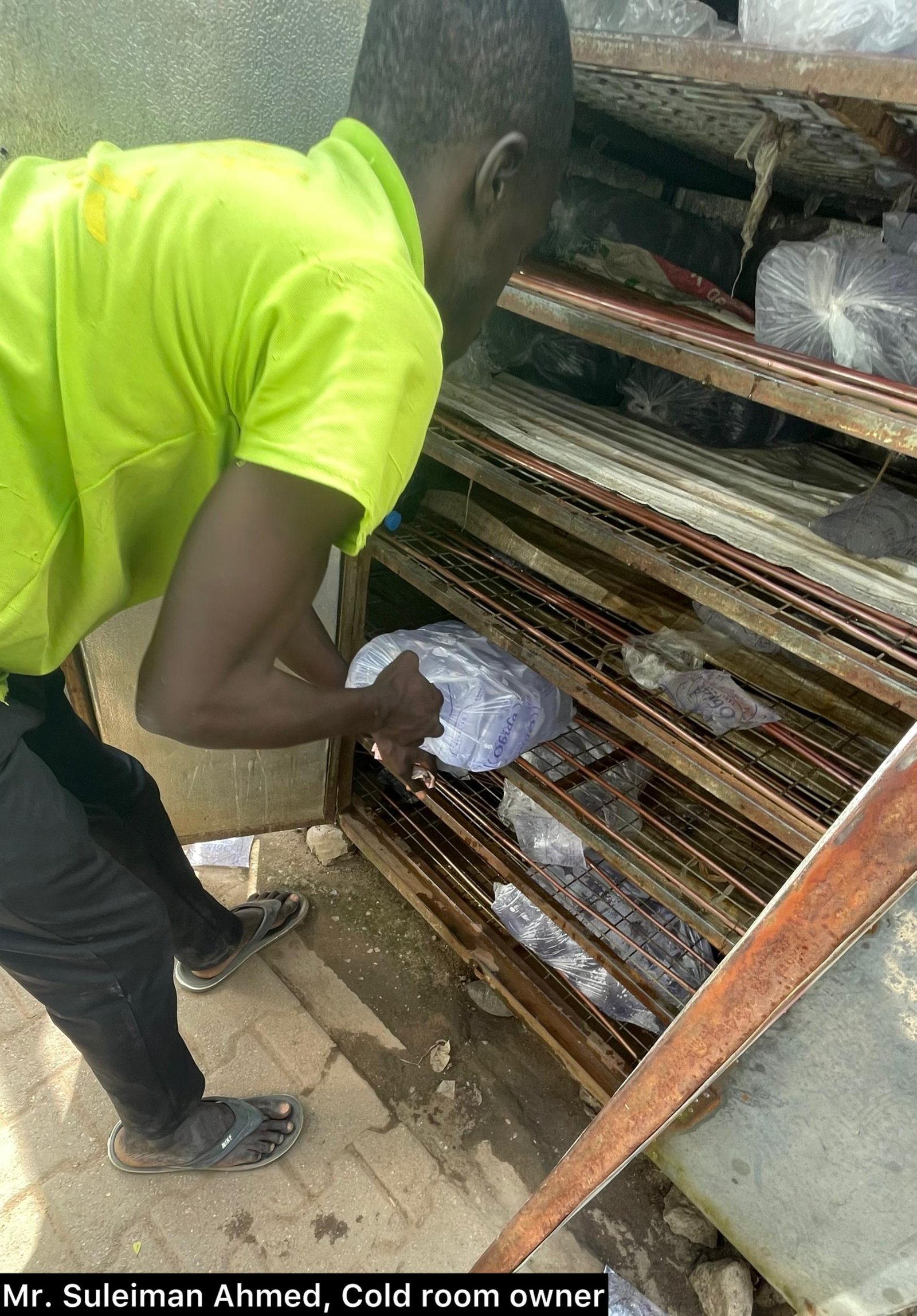
Suleiman Ahmed’s generator behind his cold-room facility.
ABUJA, Nigeria – In Lugbe, the fast-growing settlement that hugs Abuja’s Airport Road, the night does not fall quietly. It vibrates. It shakes. It coughs and spits fumes. As generator engines growl like angry beasts behind every shopfront and every block of flats, the people who live and work here are locked in a daily contest with darkness — a contest they are losing.
In this report, Chukwu Obinna journeys into a community where electricity has become a luxury, development a slogan, and survival an act of endurance. Through the voices of barbers, cold-room operators, tailors, café owners, health workers, and exhausted parents to expose how Lugbe has become the poster child for Nigeria’s energy inequality — and why its struggles matter for the future of the Federal Capital Territory.
THE COLLAPSE OF THE GRID
Lugbe, a bustling commercial hub barely 20 minutes from central Abuja, operates in conditions that disgrace the capital’s claims to modernity. Entire neighbourhoods spend days — sometimes weeks — without a single spark of grid supply.
The consequences stretch far beyond inconvenience. Markets stall, shops shut early, salons reduce opening hours, food spoils, medical tools malfunction, and entire economic ecosystems buckle under the burden of fuel dependence.
This is not an isolated failure. According to the International Energy Agency, Nigeria has the world’s largest electricity-access deficit. Some 85 million people remain without power, and millions more, like Lugbe’s residents, are “connected” only in name.
Even within Abuja, inequality is stark. While Maitama and Asokoro enjoy 16 to 20 hours of daily supply, Lugbe often gets less than 10 per cent of the month. Power allocation mirrors wealth and political influence — and Lugbe sits firmly at the bottom of that hierarchy.
“MY REAL BUSINESS IS FUEL”: WHERE ENTERPRISES ARE DYING
At his Federal Housing Authority, Lugbe, a cold-room facility owner, Mr. Suleiman Ahmed watches his once-profitable water business crumble.
“Every day, the machine roars for six to eight hours, six days a week, and I spend more than ₦200,000 monthly on fuel — over five times my ₦40,000 rent,” he lamented.

World Bank research shows that Nigerian SMEs lose up to 40% of potential revenue due to unreliable electricity. For Ahmed, the losses are even steeper: fuel alone takes over 80 per cent of his operating costs.
Once, he spent just ₦50,000 monthly on fuel. Then came the era of rolling blackouts — and his numbers spiralled.
“Power sometimes comes at 2 a.m. when I’m asleep,” he said. “Other times, there is none for five straight weeks.”
Worse, community complaints to the Abuja Electricity Distribution Company (AEDC) routinely go unanswered.
“When transformers fail, they tell us to pay for repairs ourselves,” he added. “The transformers are too small for our population. They overload and collapse constantly.”
THE BARBER WHO REFUSED TO GIVE UP
In another corner of Lugbe, a barber, Mr. Mayowa Ibrahim recounts his own fight for survival.
“I used to spend between ₦3,000 and ₦4,000 every morning on fuel,” he said. “I charge ₦1,500 per haircut, but barbers in places with good light charge ₦1,000 and still make more money. Fuel dey chop all my profit.”

Desperate, he invested in solar power — two panels and batteries. It saved his shop, though not his peace of mind.
“Solar saved my business, but I was lucky,” he said. “Most of my colleagues can’t afford it.”
Tailors, cybercafés, welders, cold-room operators and eateries face the same nightmare. Cybercafé owner, Mr. Emmanuel Okonkwo says he spends between ₦10,000 and ₦50,000 weekly on fuel.
“Erratic supply is worse than total darkness,” he said. “If there is no hope of light, at least you can plan. Here, we can’t.”
THE SUBSIDY REMOVAL SHOCK
When Nigeria removed fuel subsidies in 2023, the fragile situation collapsed entirely. Fuel prices rocketed from ₦185 to over ₦600 per litre. Diesel jumped by more than 600 per cent. Even candles — used by low-income households — rose by 150 per cent.
Families were forced to choose between lighting their homes and feeding their children.
A LOCAL ECONOMY IN RUINS
Across Lugbe, the losses are devastating. Thousands of small enterprises now spend ₦50,000 to ₦300,000 monthly on fuel. That is money that should circulate through staff salaries, business expansion, household consumption, and community development.
World Bank data estimates that Nigeria loses $29 billion annually to power outages — about two per cent of GDP.
These losses manifest in Lugbe as: shorter business hours, higher service prices, reduced production capacity, job losses, and mass closure of micro-enterprises.
A tailor who once produced five garments a day now struggles to complete three. A café forced to shut early loses loyal clients to better-powered neighbourhoods.
A HEALTH SYSTEM IN THE DARK
Lugbe’s Primary Healthcare Centre is trapped in the same crisis. It runs almost entirely on generators, draining funds that should be used for drugs, equipment, and staff needs.
Multimedia Caption: Nurses in Lugbe Primary Healthcare Centre using phone lights during an outage.
Ultrasound machines, laboratory tools, and diagnostic equipment require stable electricity — a resource the clinic rarely enjoys.
Voltage fluctuations damage sensitive devices. Medical staff must rely on manual judgment, increasing risks of misdiagnosis and avoidable deaths.
THE SILENT POISON: GENERATOR FUMES
The generator economy has turned Lugbe into an invisible health hazard. Thousands of machines pump carbon monoxide and particulates into the air daily.
Long-term exposure causes: chronic headaches, respiratory infections, fatigue, heart complications, and neurological damage.
Most generators sit close to homes, shops and walkways, offering residents no protection from toxic fumes.
INEQUALITY BY DESIGN
While Maitama enjoys pristine tree-lined streets and near-constant electricity, Lugbe’s residents pay comparable tariffs for a fraction of the supply. On some streets here, power comes once in 35 consecutive days.
The disparity deepens poverty and reinforces Abuja’s class divide. It also undermines Nigeria’s commitment to Sustainable Development Goals on clean energy, decent work, health, and equality.
THE PATH FORWARD
Lugbe’s energy crisis is solvable — but only if policymakers choose to act.
Key steps include upgrading transformers to match population growth, enforcing equitable power distribution across districts, reviewing tariffs to reflect actual supply, expanding solar adoption through subsidies and micro-credit, providing dedicated power solutions for health facilities, enforcing environmental standards to limit generator pollution.
The success of entrepreneurs like Mayowa shows renewable energy can restore stability — but only government intervention can scale it.
Today in Lugbe, the generators roar. Fuel gauges sink. Business owners calculate impossible budgets. Children squint over homework by candlelight. Healthcare workers improvise in the dark. Families grow poorer.
“Stop making us pay through bills and community contributions for your broken transformers,” Mayowa implored. “We just want reliable electricity.”
For Suleiman Ahmed, the message is even sharper:
“When they bring light at 2 a.m. or take it immediately, when they force us to repair their equipment with our money, they are saying our businesses don’t matter. Our community doesn’t matter. Our health doesn’t matter. That must change.”
Until Abuja decides that development must include everyone — not just the wealthy — Lugbe will remain in darkness.
And with it, a part of Nigeria’s promise will remain dimmed.




